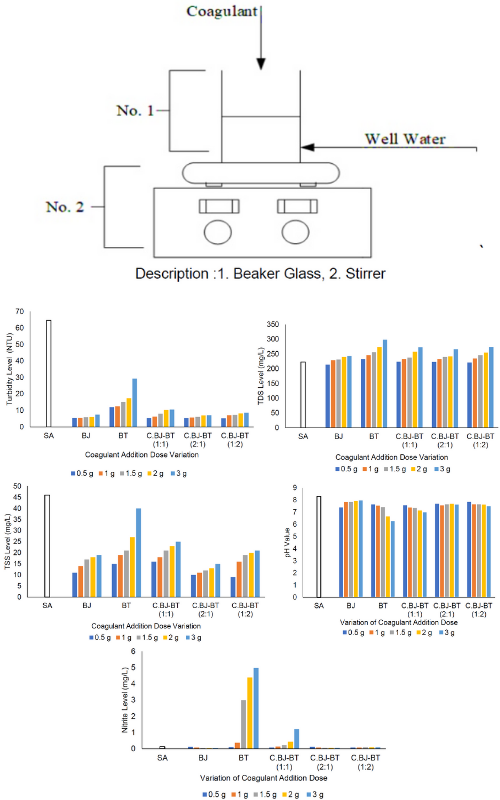The Effectiveness Of Coagulant Stems And Seeds Of Moringa Oleifera In Improving The Quality Of Well Water
Main Article Content
Abstract
This study investigates the effectiveness of natural coagulants derived from Moringa oleifera specifically seeds, stems, and their mixtures in improving well water quality through a coagulation treatment process. Coagulants were prepared by drying and grinding mature Moringa seeds and stems, then applied to 1000 mL samples of well water stirred at 10 rpm for 20 minutes. The coagulant dosages tested were 0.5 g, 1 g, 1.5 g, 2 g, and 3 g, with combination ratios of 1:1, 1:2, and 2:1 (seed : stem). Water quality parameters measured before and after treatment included turbidity, total suspended solids (TSS), total dissolved solids (TDS), pH, nitrite (NO₂), manganese (Mn), iron (Fe), and biochemical oxygen demand (BOD). Results showed that the Moringa seed coagulant exhibited the highest removal efficiency across most parameters, particularly in reducing turbidity, TSS, Fe, and Mn concentrations. The optimal dose for all coagulants was identified as 0.5 g per 1000 mL, beyond which removal efficiency declined or plateauedlikely due to particle restabilization. Mixtures of seed and stem showed moderate effectiveness but did not outperform seed-only treatments, indicating that the active coagulating agents are more concentrated in the seeds. These findings highlight the potential of Moringa seed powder as a low-cost, sustainable, and efficient natural coagulant for decentralized water purification, particularly in rural or resource-constrained areas where access to chemical coagulants is limited.
Downloads
Article Details
Section

This work is licensed under a Creative Commons Attribution-ShareAlike 4.0 International License.





